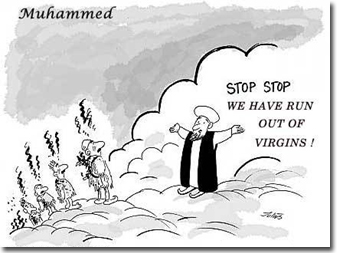|
The case would have been thrown out long ago if I had
been charged in a criminal court, instead of a human rights
commission. That’s because accused criminals have the right to a
speedy trial. Accused publishers at human rights commissions do
not.
And if I had been a defendant in a civil court, the
judge would now order the losing parties to pay my legal bills.
Instead, the Edmonton Council of Muslim Communities won’t have
to pay me a dime. Neither will Syed Soharwardy, the Calgary imam
who abandoned his identical complaint against me this spring.
Both managed to hijack a secular government agency to
prosecute their radical Islamic fatwa against me—the first blasphemy case in Canada in over 80 years. Their complaints were
dismissed, but it is inaccurate to say that they lost: They got
the government to rough me up for nearly three years, at no cost
to them. The process I was put through was a punishment in
itself—and a warning to any other journalists who would defy
radical Islam.
 The 11-page government report into my activities is a
breathtakingly arrogant document. In it, Pardeep Gundara, a low-level
bureaucrat, assumes the role of editor-in-chief for the entire
province of Alberta. He went through our magazine article and
gave his own thoughts on the cartoons, and pronounced on our
magazine’s decision to publish them. The government’s wannabe
journalist gets facts wrong and he’s obviously not good with
deadlines. We’d never have hired him at our magazine. But the
laugh is on us—he’s apparently our boss, and the boss of all
journalists in Alberta.
The 11-page government report into my activities is a
breathtakingly arrogant document. In it, Pardeep Gundara, a low-level
bureaucrat, assumes the role of editor-in-chief for the entire
province of Alberta. He went through our magazine article and
gave his own thoughts on the cartoons, and pronounced on our
magazine’s decision to publish them. The government’s wannabe
journalist gets facts wrong and he’s obviously not good with
deadlines. We’d never have hired him at our magazine. But the
laugh is on us—he’s apparently our boss, and the boss of all
journalists in Alberta.
In his report, Gundara presents as “fact” his personal
opinion of the Muhammad cartoons. He says they’re
“stereotypical, negative and offensive.” That’s one viewpoint.
Others have a different view. Why should anyone care about
Gundara’s personal opinion? Do I need permission from him—or
anyone other than my conscience—before I publish things in the
future? Is this column OK by him?
Gundara forgave me and the Western Standard our
sins because, according to him, the offensiveness of the
cartoons was “muted by the context of the accompanying article”
and we ran letters both for and against the cartoons in our
subsequent issue. He also acquitted us because “the cartoons
were not simply stuck in the middle of the magazine with no
purpose or related story.”
|


 The 11-page government report into my activities is a
breathtakingly arrogant document. In it, Pardeep Gundara, a low-level
bureaucrat, assumes the role of editor-in-chief for the entire
province of Alberta. He went through our magazine article and
gave his own thoughts on the cartoons, and pronounced on our
magazine’s decision to publish them. The government’s wannabe
journalist gets facts wrong and he’s obviously not good with
deadlines. We’d never have hired him at our magazine. But the
laugh is on us—he’s apparently our boss, and the boss of all
journalists in Alberta.
The 11-page government report into my activities is a
breathtakingly arrogant document. In it, Pardeep Gundara, a low-level
bureaucrat, assumes the role of editor-in-chief for the entire
province of Alberta. He went through our magazine article and
gave his own thoughts on the cartoons, and pronounced on our
magazine’s decision to publish them. The government’s wannabe
journalist gets facts wrong and he’s obviously not good with
deadlines. We’d never have hired him at our magazine. But the
laugh is on us—he’s apparently our boss, and the boss of all
journalists in Alberta.